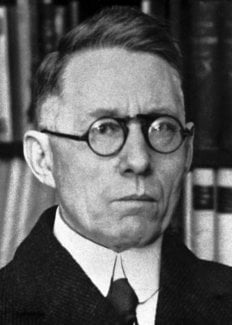Johannes V. Jensen
Biographical

I was born on the 20th of January, 1873, in a village in North Jutland, the second son of the district veterinary surgeon, H. Jensen, a descendant on both sides of farmers and craftsmen. In 1893, at the age of twenty, I graduated from the Cathedral School of Viborg, and subsequently studied medicine for three years at the University of Copenhagen. I earned my living by my pen until it became necessary for me to choose between further studies and literature. The grounding in natural sciences which I obtained in the course of my medical studies, including preliminary examinations in botany, zoology, physics, and chemistry, was to become decisive in determining the trend of my literary work.
My literary career began near the turn of the century with the publication of Himmerlandshistorier (1898-1910) [Himmerland Stories], comprising a series of tales set in that part of Denmark where I was born. This was followed in the years up to 1944 by «legends» and«myths» representing literary forms I have particularly liked, and of which nine volumes have appeared (Myter, 1907-45 [Myths]). I have also written poetry, a few plays, and many essays, chiefly on anthropology and the philosophy of evolution.
For many years I was engaged in journalism, writing articles and chronicles for the daily press without ever joining the staff of any newspaper. Nor have I ever belonged to any political party. After extensive journeys to the East, to Malaya and China, and several visits to the United States, I inspired a change in the Danish literature and press by introducing English and American vigour, which was to replace the then dominant trend of decadent Gallicism. The essence of my literary work is to be found in my collection of poems, which may be regarded as a reaction against the fastidious style of the day bearing Baudelaire’s poisonous hall-mark. My poems represented a turn to simple style and sound subject matter (Digte, 1904-41, 1943 [Poems]).
A probing analysis of the problems of evolution forms the basis of my prose. During half a century of literary work, I have endeavoured to introduce the philosophy of evolution into the sphere of literature, and to inspire my readers to think in evolutionary terms. I was prompted to do this because of the misinterpretation and distortion of Darwinism at the end of the 19th century. The concept of the Übermensch had disastrous consequences in that it led to two world wars, and was destroyed only with the collapse of Germany in 1945. In the course of opposing this fallacious doctrine, I have arrived at a new interpretation of the theory of evolution and its moral implications.
Biographical note on Johannes V. Jensen
Johannes V. Jensen (1873-1950) developed his theories of evolution in a cycle of six novels, Den lange rejse (1908-22) [The Long Journey], which was published in a two-volume edition in 1938.
This autobiography/biography was written at the time of the award and first published in the book series Les Prix Nobel. It was later edited and republished in Nobel Lectures. To cite this document, always state the source as shown above.
Johannes V. Jensen died on 25 November 1950.
The Nobel Foundation's copyright has expired.Nobel Prize announcements 2025
This year’s Nobel Prize announcements will take place 6–13 October. All announcements will be streamed live here on nobelprize.org.
